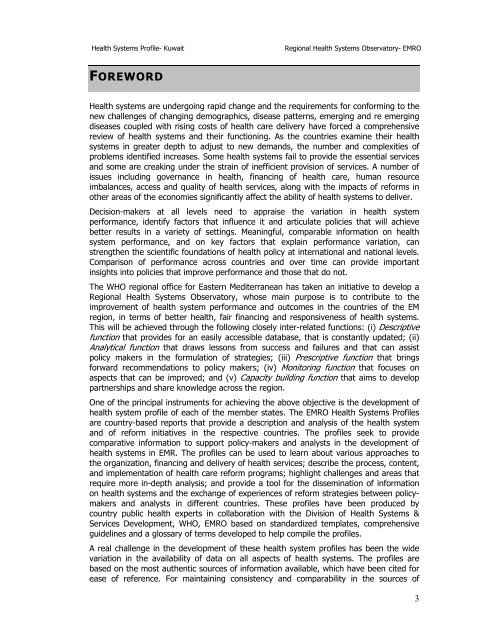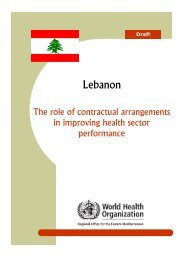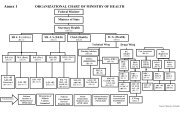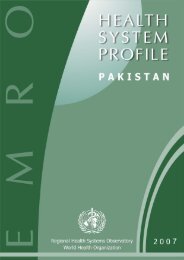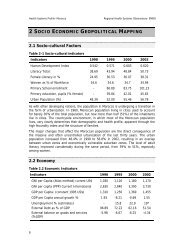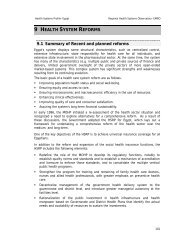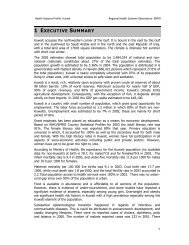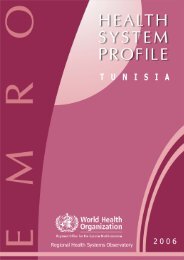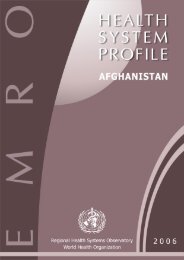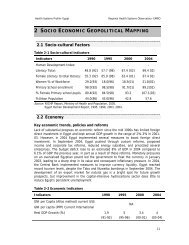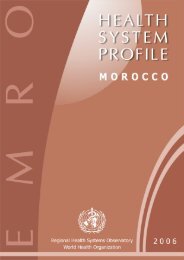Kuwait : Complete Profile - What is GIS - World Health Organization
Kuwait : Complete Profile - What is GIS - World Health Organization
Kuwait : Complete Profile - What is GIS - World Health Organization
You also want an ePaper? Increase the reach of your titles
YUMPU automatically turns print PDFs into web optimized ePapers that Google loves.
<strong>Health</strong> Systems <strong>Profile</strong>- <strong>Kuwait</strong> Regional <strong>Health</strong> Systems Observatory- EMRO<br />
FOREWORD<br />
<strong>Health</strong> systems are undergoing rapid change and the requirements for conforming to the<br />
new challenges of changing demographics, d<strong>is</strong>ease patterns, emerging and re emerging<br />
d<strong>is</strong>eases coupled with r<strong>is</strong>ing costs of health care delivery have forced a comprehensive<br />
review of health systems and their functioning. As the countries examine their health<br />
systems in greater depth to adjust to new demands, the number and complexities of<br />
problems identified increases. Some health systems fail to provide the essential services<br />
and some are creaking under the strain of inefficient prov<strong>is</strong>ion of services. A number of<br />
<strong>is</strong>sues including governance in health, financing of health care, human resource<br />
imbalances, access and quality of health services, along with the impacts of reforms in<br />
other areas of the economies significantly affect the ability of health systems to deliver.<br />
Dec<strong>is</strong>ion-makers at all levels need to appra<strong>is</strong>e the variation in health system<br />
performance, identify factors that influence it and articulate policies that will achieve<br />
better results in a variety of settings. Meaningful, comparable information on health<br />
system performance, and on key factors that explain performance variation, can<br />
strengthen the scientific foundations of health policy at international and national levels.<br />
Compar<strong>is</strong>on of performance across countries and over time can provide important<br />
insights into policies that improve performance and those that do not.<br />
The WHO regional office for Eastern Mediterranean has taken an initiative to develop a<br />
Regional <strong>Health</strong> Systems Observatory, whose main purpose <strong>is</strong> to contribute to the<br />
improvement of health system performance and outcomes in the countries of the EM<br />
region, in terms of better health, fair financing and responsiveness of health systems.<br />
Th<strong>is</strong> will be achieved through the following closely inter-related functions: (i) Descriptive<br />
function that provides for an easily accessible database, that <strong>is</strong> constantly updated; (ii)<br />
Analytical function that draws lessons from success and failures and that can ass<strong>is</strong>t<br />
policy makers in the formulation of strategies; (iii) Prescriptive function that brings<br />
forward recommendations to policy makers; (iv) Monitoring function that focuses on<br />
aspects that can be improved; and (v) Capacity building function that aims to develop<br />
partnerships and share knowledge across the region.<br />
One of the principal instruments for achieving the above objective <strong>is</strong> the development of<br />
health system profile of each of the member states. The EMRO <strong>Health</strong> Systems <strong>Profile</strong>s<br />
are country-based reports that provide a description and analys<strong>is</strong> of the health system<br />
and of reform initiatives in the respective countries. The profiles seek to provide<br />
comparative information to support policy-makers and analysts in the development of<br />
health systems in EMR. The profiles can be used to learn about various approaches to<br />
the organization, financing and delivery of health services; describe the process, content,<br />
and implementation of health care reform programs; highlight challenges and areas that<br />
require more in-depth analys<strong>is</strong>; and provide a tool for the d<strong>is</strong>semination of information<br />
on health systems and the exchange of experiences of reform strategies between policymakers<br />
and analysts in different countries. These profiles have been produced by<br />
country public health experts in collaboration with the Div<strong>is</strong>ion of <strong>Health</strong> Systems &<br />
Services Development, WHO, EMRO based on standardized templates, comprehensive<br />
guidelines and a glossary of terms developed to help compile the profiles.<br />
A real challenge in the development of these health system profiles has been the wide<br />
variation in the availability of data on all aspects of health systems. The profiles are<br />
based on the most authentic sources of information available, which have been cited for<br />
ease of reference. For maintaining cons<strong>is</strong>tency and comparability in the sources of<br />
3


